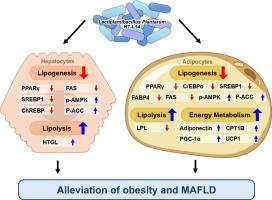Heat-treated culture-dried Lactiplantibacillus Plantarum L-14 suppresses adipogenesis and lipogenesis in 3T3-L1 and HepG2 cells
IF 4
2区 农林科学
Q2 FOOD SCIENCE & TECHNOLOGY
引用次数: 0
Abstract
Obesity is a growing global health issue prompting the development of probiotic-based interventions. This study investigated whether heat-treated culture-dried L14 (HT-L14) retains these benefits. In HepG2 cells, HT-L14 reduced palmitate-induced lipid accumulation suppressed lipogenic genes including sterol regulatory element-binding protein 1 and carbohydrate-responsive element-binding protein, and activated AMP-activated protein kinase (AMPK) and acetyl-CoA carboxylase (ACC), promoting lipid oxidation. In 3T3-L1 cells, HT-L14 inhibited adipocyte differentiation, reduced the expression of peroxisome proliferator-activated receptor gamma (PPARγ) and CCAAT/enhancer-binding protein alpha (C/EBPα), and increased energy metabolism-related gene expression. RNA sequencing analysis revealed differential gene expression enriched in lipid metabolism and insulin signaling pathways. HT-L14 exhibited no cytotoxicity and demonstrated improved safety compared to live L14 in HepG2 and 3T3-L1 cells. These findings suggest that HT-L14 retains anti-obesity efficacy with enhanced stability, supporting its potential as a therapeutic candidate for obesity and metabolic disorders.

热处理培养干燥的植物乳杆菌L-14抑制3T3-L1和HepG2细胞的脂肪生成和脂肪生成
肥胖是一个日益严重的全球健康问题,促进了基于益生菌的干预措施的发展。本研究调查了热处理培养干燥的L14 (HT-L14)是否保留了这些益处。在HepG2细胞中,HT-L14减少棕榈酸盐诱导的脂质积累,抑制脂肪生成基因,包括固醇调节元件结合蛋白1和糖反应元件结合蛋白,激活amp活化蛋白激酶(AMPK)和乙酰辅酶a羧化酶(ACC),促进脂质氧化。在3T3-L1细胞中,HT-L14抑制脂肪细胞分化,降低过氧化物酶体增殖物激活受体γ (PPARγ)和CCAAT/增强子结合蛋白α (C/EBPα)的表达,增加能量代谢相关基因的表达。RNA测序分析显示脂质代谢和胰岛素信号通路中富集的差异基因表达。与活的L14相比,HT-L14在HepG2和3T3-L1细胞中没有细胞毒性,并且显示出更高的安全性。这些发现表明HT-L14保持了抗肥胖的功效并增强了稳定性,支持其作为肥胖和代谢紊乱的治疗候选药物的潜力。
本文章由计算机程序翻译,如有差异,请以英文原文为准。
求助全文
约1分钟内获得全文
求助全文
来源期刊

Journal of Functional Foods
FOOD SCIENCE & TECHNOLOGY-
CiteScore
9.60
自引率
1.80%
发文量
428
审稿时长
76 days
期刊介绍:
Journal of Functional Foods continues with the same aims and scope, editorial team, submission system and rigorous peer review. We give authors the possibility to publish their top-quality papers in a well-established leading journal in the food and nutrition fields. The Journal will keep its rigorous criteria to screen high impact research addressing relevant scientific topics and performed by sound methodologies.
The Journal of Functional Foods aims to bring together the results of fundamental and applied research into healthy foods and biologically active food ingredients.
The Journal is centered in the specific area at the boundaries among food technology, nutrition and health welcoming papers having a good interdisciplinary approach. The Journal will cover the fields of plant bioactives; dietary fibre, probiotics; functional lipids; bioactive peptides; vitamins, minerals and botanicals and other dietary supplements. Nutritional and technological aspects related to the development of functional foods and beverages are of core interest to the journal. Experimental works dealing with food digestion, bioavailability of food bioactives and on the mechanisms by which foods and their components are able to modulate physiological parameters connected with disease prevention are of particular interest as well as those dealing with personalized nutrition and nutritional needs in pathological subjects.
 求助内容:
求助内容: 应助结果提醒方式:
应助结果提醒方式:


